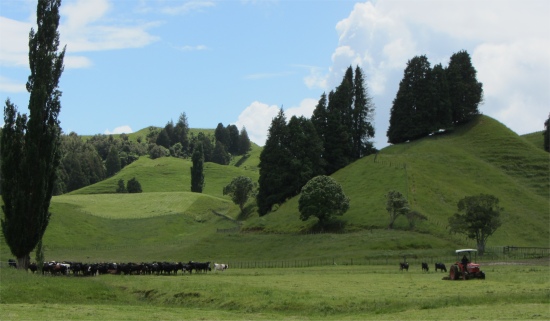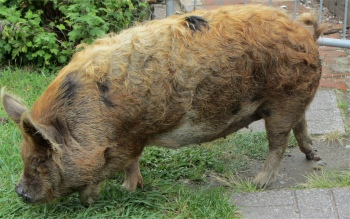Helene had informed me of a trail not too far away where there are glowworms. The tiny creatures had taken up residence in an old railway cutting, the steep, high banks providing the ideal dark, damp environment that they love. I knew daylight hours would be useless for glowworm hunting, but hoping there might be some remnants of industrial archaeology there, I decided to pay the area a visit.
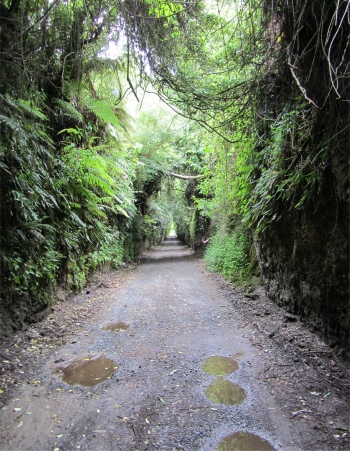
Te Rena Road
|
I headed along Highway 4 in the direction of the National Park, climbed up high out of Piriaka, and stopped off at Piriaka Lookout. I was afforded a magnificent sweep of countryside with the Whanganui River meandering along the base of a valley. I gazed at a train wending its way alongside the river, and stayed until it thundered its way past far below me.
I took the turn off to Kakahi, which derives its name from the Kakahi fresh water shellfish which may be found in the area. During the 1900s, Kakahi was essentially a sawmilling township and was supported by the two sawmills of the Railways Department which were situated there. The Railways Department employed 130 people from a population of 600 in the two mills. (At the 2006 Census there was a population of 132). Kakahi Township consisted of two boarding houses, two stores, butcher, baker, billiard saloon, public hall, school and church. The houses of the mill hands were scattered around the mills and completed the settlement, the mills on one side of the river, the township on the other and were all dominated by the railway bridge.
The pumice cutting (now Te Rena Road) was originally dug for a proposed Kakahi-Pukawa (south-western shores of Lake Taupo) railway. The railway was to exploit the timber of Lake Taupo's Western forests and open up the southern lake area, which had, at the time, no easy transport connections with the outside world. The long term plan was for this railway to connect with Taupo and Rotorua.
I eventually found myself driving down a long straight gravel road, Te Rena Road, which took me through the 200m long pumice cutting. With the canopy from the trees above covering the cutting, it seemed as if I was driving down a narrow tunnel. The far end of the tunnel brought me to the river where I parked up.
Sadly there was no trace of any lost industry either here or in Kakahi. I walked back up through the cutting, the entrance of which was guarded by legions of foxgloves. The cutting was very shady and damp, and I looked for evidence of glowworms in the form of feeder lines, but they must all have been higher up in the nooks and crannies. The short stretch of "tunnel" had the sickly, sweet smell of decay, and hummed loudly with bees. Spiders' webs clothed the steep banks, harvesting the swarms of tiny flying insects. In a way I preferred to observe the cutting and all it had to offer in the daytime, when I could appreciate the rich variety of smells, colours and textures. At night, I would be stumbling around with a torch looking for glowworms.
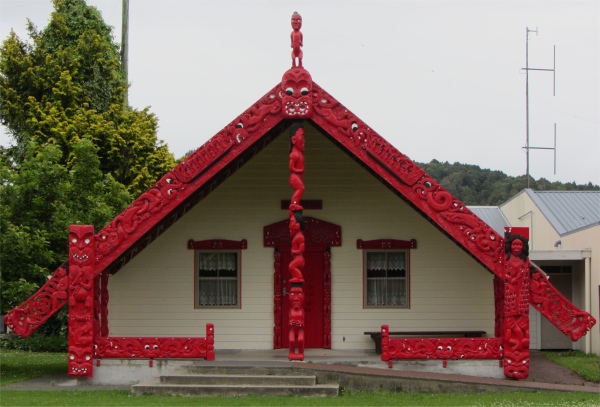
Marae (Maori Meeting House)
|
Once I had satisfied my curiosity, I headed back to Taumarunui, and explored the length and breadth of it in less than 10 minutes. It too had a covered walkway to protect me from the rains which had returned in earnest. I visited an art gallery that was almost closing, and an exhibition by a Maori artist, who was babysitting his three children and simultaneously talking to me about his art and my travel. A call from his wife cut short our conversation.
So it was back to the campsite to catch up with note typing in the communal kitchen. A Canadian couple had just finished their meal. They had just graduated, he in Psychology, she in Conservation Biology. This was their time out before returning to do a Masters. Another young Porto Rican woman in the kitchen had recently attended a conference in Auckland on Conservation Biology, and was taking a little time out to look around before flying back home. We exchanged notes on our traveling experiences, the vehicle deals we had settled on, and what our plans for the rest of our trips were. The Canadians were interested in the idea of doing voluntary work overseas after their Masters. Good for them, if the job market is still buoyant for them, go for it.
A german speaking family came in to cook a meal. They were originally from Berlin, but now lived in China, a few hours north of Shanghai. In the relatively short time they have been there, they had seen vast populations move into the cities from the countryside, and cities that once held 1M people are now bursting at the seams with 3-4M people. The chap looked out of the kitchen window at the grey sky. "It is always grey in China. We see a blue sky just a few times a year," he said. "Why, is that because of pollution?" I asked. "Well, it is always foggy, that is part of the climate. But there is always dust in the air too. The city is surrounded by desert, and there is so much building work going on that there is a constant cloud of dust in the air," he answered in a resigned fashion. Their meal was by now cooked, and off the family trooped to eat it in whatever they were staying in.
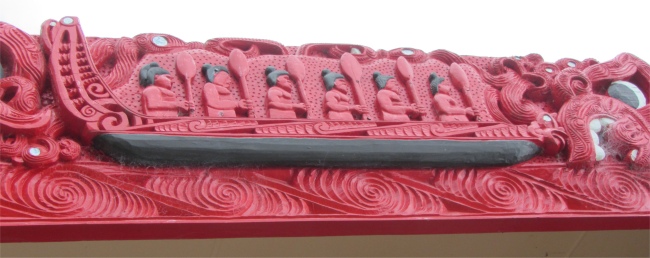
Detail from Marae
|
The young girls from the family returned later to wash the dishes. They were curious about what I was typing, so I showed them my blog. "Can we see that on the internet?" they asked. "Of course you can," I replied, telling them how to find it. Their mum popped in soon to make sure they weren't slacking. I was totally amazed how confident these young lasses were, and their English was fluent. Their native language was German, and they also spoke Mandarin. They studied at International Schools as they travelled with their parents, and the girls asked me if I knew the Dulwich College in London. Well I know about it now. Soon the wee lasses were informing me all about the three different varieties of Kiwis, these were intelligent girls. They were a really nice family, and the children were ever so polite and grown up.
As I sat alone in the kitchen typing away, Phil, Helene's husband appeared doing his rounds. He was an ex-army fellow, and he regaile me with many tales of his rugby and sailing exploits; he'd had quite a few close shaves. He told me how he and his wife had bought the campsite off two brothers when it was pretty run down, on a 30-year lease. He had put a lot of time, money and effort into licking it into shape, but at the end of the day, the council still owned most of the buildings. He was hoping that he could own the buildings outright at some point in time. He knew he'd never make his millions from it, but it was a way of getting along through life. The town had suffered hardships lately. The successful freezing company had been bought out by two competitors, who immediately closed it down. The rail company had downsized for 20,000 employees to 6,000, and so on. He said it is only over the last few years that the town has started to pick up again. There are moves afoot to really boost the tourism industry. Indeed one entrepreneur is setting up a rail link with Stratford, the aim being for converted golf buggies to travel the length of the track one way only with each customer's possessions in a container on the back of their buggy.
Eventually I caught up with my notes and called it a day. By this time everyone else was sound asleep.
